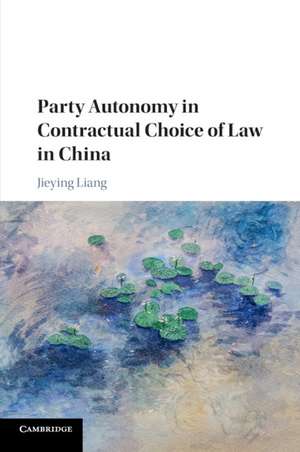Party Autonomy in Contractual Choice of Law in China
Autor Jieying Liangen Limba Engleză Paperback – 7 aug 2019
| Toate formatele și edițiile | Preț | Express |
|---|---|---|
| Paperback (1) | 321.31 lei 6-8 săpt. | |
| Cambridge University Press – 7 aug 2019 | 321.31 lei 6-8 săpt. | |
| Hardback (1) | 765.43 lei 3-5 săpt. | +27.60 lei 7-13 zile |
| Cambridge University Press – 21 mar 2018 | 765.43 lei 3-5 săpt. | +27.60 lei 7-13 zile |
Preț: 321.31 lei
Nou
Puncte Express: 482
Preț estimativ în valută:
61.48€ • 64.42$ • 50.83£
61.48€ • 64.42$ • 50.83£
Carte tipărită la comandă
Livrare economică 12-26 aprilie
Preluare comenzi: 021 569.72.76
Specificații
ISBN-13: 9781108738323
ISBN-10: 110873832X
Pagini: 375
Dimensiuni: 152 x 229 x 19 mm
Greutate: 0.5 kg
Editura: Cambridge University Press
Colecția Cambridge University Press
Locul publicării:Cambridge, United Kingdom
ISBN-10: 110873832X
Pagini: 375
Dimensiuni: 152 x 229 x 19 mm
Greutate: 0.5 kg
Editura: Cambridge University Press
Colecția Cambridge University Press
Locul publicării:Cambridge, United Kingdom
Cuprins
1. The development of the party autonomy principle in China; 2. The background to the development of party autonomy; 3. The existence and validity of parties' choice of law; 4. The 'law' that can be chosen by parties; 5. Statutory restrictions on party autonomy (I); 6. Statutory restrictions on party autonomy (II); 7. Ascertainment of the foreign law chosen by parties; 8. Contractual choice of law under the 'One Country, Two Systems' regime; 9. The party autonomy principle in the context of the Chinese legal system.
Recenzii
'The book analyses party autonomy in PRC law. It considers when the PRC courts will override parties' express choice of law in the social or public interest. It also discusses the likelihood (or not) of PRC courts allowing parties to stipulate non-state law (e.g., the lex mercatoria) as contractual governing law. As a bonus, it sets out the historical and philosophical underpinnings of party autonomy in China. The work is to be commended for its clarity and breadth.' Anselmo Reyes, The University of Hong Kong
'Private commercial relations with the People's Republic of China have grown significantly in recent years. Mechanisms for international dispute resolution are therefore important. Given differences in substantive law and uncertainty about a commercial partner's legal system, private agreements on the applicable law (party autonomy) become of central importance. Jieying Liang's work is a masterful and comprehensive study of the development of party autonomy and its present status under the 2010 Chinese Conflicts Statute, including limitations resulting from mandatory norms and the ability to choose non-state law. It is an indispensable resource.' Peter Hay, L. Q. C. Lamar Professor of Law Emory University, Atlanta
'Private commercial relations with the People's Republic of China have grown significantly in recent years. Mechanisms for international dispute resolution are therefore important. Given differences in substantive law and uncertainty about a commercial partner's legal system, private agreements on the applicable law (party autonomy) become of central importance. Jieying Liang's work is a masterful and comprehensive study of the development of party autonomy and its present status under the 2010 Chinese Conflicts Statute, including limitations resulting from mandatory norms and the ability to choose non-state law. It is an indispensable resource.' Peter Hay, L. Q. C. Lamar Professor of Law Emory University, Atlanta
Notă biografică
Descriere
An original analysis of the practical operation of the party autonomy principle in contractual choice of law in China.
